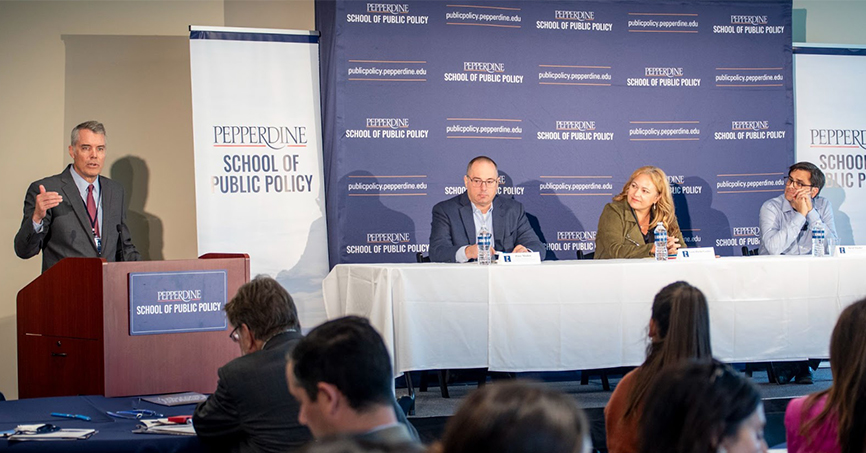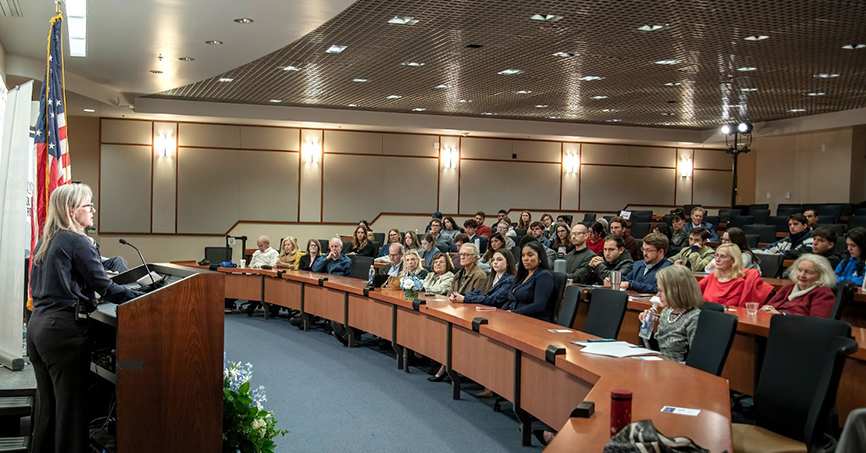What to Expect in an MPP Program

If you're considering a career in public sector, a Master of Public Policy (MPP) degree will set you up with the knowledge and experience you need to succeed. An MPP degree encourages students to strengthen the processes and ideas that connect the government and the individual on a local, national, and international scale. At Pepperdine University’s School of Public Policy, the MPP program balances quantitative and qualitative analysis alongside to prepare the next generation of servant leaders to make informed public policy decisions in their respective specializations. In this blog, we'll cover everything you need to know about a Master of Public Policy degree at the Pepperdine School of Public Policy as well as public policy career opportunities.
What You'll Learn
At Pepperdine University's School of Public Policy, students are challenged to understand the history and philosophy behind free institutions alongside quantitative economics and policy analysis. With an education based in the Judeo-Christian understanding of servant leadership, students will be prepared to fulfill impactful careers in policy. You can expect an exciting combination of core courses, specialized tracks, and professional experiences that will prepare you for a career in public policy.
MPP Courses
Pepperdine's program includes 50 units of coursework that can be finished in 20 months. Your first year lays the foundation with core courses from the James Q. Wilson curricula that prepare you for specializations in your second year.
Specialization Options
The MPP program at Pepperdine University offers five specializations allowing students to tailor their academic program to their specific interests and passions.
-
American Policy and Politics
The American Policy and Politics track focuses on American society through a political, economic, and social lens on federal and local policies and political dynamics. Career paths of this track includes Capital Hill staff, corporate or government communications, federal agency staff, and national nonprofits.
-
International Relations and National Security
With a specialization in International Relations and National Security you'll study the intricacies of foreign policy, decode the language of international alliances, and get a handle on the ever-changing world of global relations. If you're drawn to the idea of being at the forefront of shaping the nation's foreign policy and security strategies, this is where you'll build that foundation.
-
Applied Economic Policy
A focus on Applied Economic Policy will dive into the role of the government in a market economy. This specialization looks at policies surrounding urban and global issues, the valuation of law, and regional and metropolitan growth. If analyzing economic trends and data data research sounds like something you'd be good at, this specialization is for you.
-
Public Policy and Dispute Resolution
In the Public Policy and Dispute Resolution specialization, you'll be challenged on how to solve public issues in a collaborative approach and the ability to navigate a variety of differing views. As our society becomes more polarized, leaders must be equipped with the policy expertise and skills to mediate and find solutions across differences.
-
State and Local Policy
The State and Local Policy track is for those who feel passionate about community-level change. You’ll explore how regions grow, develop, and can be effectively governed. If getting involved where policies have a direct, immediate impact sounds rewarding to you, state and local policy is your area.
Public Policy Internship
A Public Policy Internship is an opportunity to bridge between academic preparation and professional experience. At the Pepperdine School of Public Policy, there is a required 240-hour internship in an agency related to the student’s area of specialization. This can include local, state, or federal government’ nonprofit organizations; the private sector; or international settings.
This internship is an opportunity to understand the intricacies of policy implementation, to see firsthand how decisions are made, and to contribute in a meaningful way. It serves as an opportunity to align your career goals with practical experience, ensuring that when you step out of the program and into the job market, you will be ready to take on whatever comes your way.

What to Expect After an MPP Program
Upon concluding the program, you can expect a journey that offers a range of career paths along with personal and professional growth opportunities.
Career Outcomes and Opportunities
The MPP program gears you up for impactful roles in multiple areas:
- Government: Your new economic analysis and policy design skills will set you up to drive initiatives in government agencies to foster economic development and address policy challenges. You’ll be equipped to assess legislation, lead strategic planning, and influence policy at various levels of government.
- Non-Profit: If your heart is in service, the nonprofit sector offers a fulfilling path. Here, you'll use your MPP skills to tackle public policy challenges, advocate for change, and oversee programs that make a real difference in communities. From policy advocacy to program development, your role is about creating positive societal impacts.
- Private Sector: In the corporate world, your analytical skills and ethical analysis capabilities will set you up to contribute meaningfully to business strategies. Your role may involve consulting, participating in economic analysis, or shaping corporate policies, all while keeping a keen eye on social responsibility and economic soundness.
- International Development: If you’re drawn to global challenges, international development offers a chance to work on initiatives that address social issues such as poverty and sustainability on a global scale. Your knowledge of economic development and public policy research will be crucial in crafting programs that enhance living standards worldwide.
- Academia and Research: As an academic or researcher, you can influence public policy through education and research. This path allows you to share your knowledge, mentor the next generation of policy leaders, and contribute to the field with original research and insights.
Beyond the Job Market
But it’s not just about the jobs. Post-MPP, you'll find yourself part of a strong network of professionals and academics. You’ll have opportunities to attend conferences, participate in policy discussions, and engage in lifelong learning through seminars and workshops. This continuous engagement keeps you at the forefront of the latest developments and trends in public policy. In addition, the skills and experiences gained during your MPP program extend beyond professional capabilities. You’ll find yourself equipped with a new perspective on problem-solving, a deeper understanding of societal issues, and enhanced communication skills that are valuable in all walks of life.
MPP vs. MPA
While a Master of Public Policy (MPP) and a Master of Public Administration (MPA) may seem similar, they have some key differences that you should consider when choosing a graduate degree program that suits your needs.
An MPP prepares policy leaders. The degree focuses intensively on the formulation and analysis of public policy. As an MPP student, you will engage with quantitative and qualitative methods to understand and evaluate policies. You would learn to analyze data, consider the socioeconomic implications of policy choices, and develop skills in economic and ethical analysis. This degree is for those who want to influence policy development, whether by crafting new policies or assessing the impact of existing ones.
An MPA is designed for administrators. It is focused on the implementation and operational management of public policies and programs. It is designed for individuals who are looking to lead teams and manage projects within public sector organizations. MPA students concentrate on building management skills, understanding organizational dynamics, and learning best practices for program execution.
Both degrees share a foundation in public service but differ in their approach to achieving and improving it.

FAQs
Are there scholarships available?
Yes, Pepperdine University offers a variety of merit based scholarships to help make graduate school accessible to qualified students. We encourage you to apply for financial aid and to search for external funding opportunities as well. Learn more on our scholarship page.
What are the admissions requirements?
Admissions requirements include a completed bachelor's degree from an accredited institution, official transcripts, a statement of purpose, a current resume, a moral dilemma essay, and letters of recommendation. The program seeks individuals with a demonstrated interest in public policy and the potential for leadership and innovation in the field.
What kind of career support does Pepperdine offer to MPP students?
Pepperdine's School of Public Policy is committed to student success beyond graduation. Career support includes networking events, career counseling, internship placement assistance, and resources for job searches. The school's strong relationships with alumni and organizations across government, nonprofit, and private sectors provide a rich network for graduates.
How does Pepperdine’s MPP program prepare students for the challenges of public policy?
We emphasize a multidisciplinary approach to policy issues, combining rigorous academic training in policy analysis skills with ethical and economic analysis. The curriculum is designed to confront current and complex public policy challenges and navigate differing views. This ensures that graduates are well-equipped to navigate the policy arena with a strong foundation in both theory and practice.
What sets Pepperdine’s program apart from other graduate programs?
The program integrates a great ideas approach grounded in classical and modern literature with rigorous quantitative analysis. This unique combination prepares students for leadership with a deep understanding of the philosophical foundations of democracy and the practical skills necessary for policy development and analysis. Our California campus also offers unique opportunities for engagement with diverse policy issues in one of the nation's most dynamic states.
Get Started Today
The Master of Public Policy program at Pepperdine University is a great next step towards making a significant impact in the world of public policy. With a comprehensive curriculum tailored to meet the ever-evolving policy landscape, world-class faculty with hands-on experience, and an alumni network that spans across the world, you're not just starting a program—you're starting a journey to make a difference.
Take the first step and learn more about the MPP program. Join us at Pepperdine University and start making your mark on public policy.